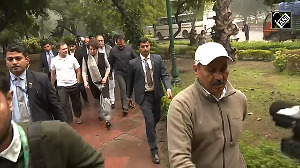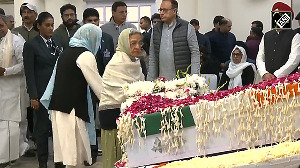The Bush Administration has pledged to favour and support a bipartisan legislation on the Indo-US civilian nuclear deal.
At the same time, it asserted that was against any 'deal-breaker' amendments by the US Congress that would force it to 'go back and renegotiate' the pact.
"We have pledged to the Congress that we would favour, support, a majority vote, a straight up and down vote in the Congress at the end of the process on that US-India bilateral agreement," said Undersecretary of State for Political Affairs Nicholas Burns, the administration's point-man for the pact that would enable US to share civilian nuclear technology with India.
- Also See: President Bush in India
"I made that commitment to many members of the House and Senate and I think that will be an important provision of the final piece of legislation... I am sure Congress will want to add its own ideas on the bill. The bill can be strengthened by Congressional ideas," Burns told a forum on the deal, organised on Wednesday by the Congressional Task Force on US-India Trade and US India Business Alliance.
But he warned: "We have always said that we wouldn't support deal breakers--requirements and amendments that would force us to go back and renegotiate this agreement."
"Because of the interplay between the Congress and the administration, this is a stronger bill because Congress has been able to add its own views and I think the Bill is strengthened because of that. We are optimistic that this legislation can now go forward," Burns said, adding, "we have an opportunity to have bipartisan victory for the American people."
The House International Relations Committee is scheduled on June 27 for a 'mark-up'-- or fine-tuning the text -- of a bipartisan legislation authored by its chairman Henry Hyde and Ranking member Tom Lantos.
The next day, Senate Foreign Relations Committee would mark-up a bill authored by its Chairman Richard Lugar and Ranking Democrat Jospeh Biden.
Burns said the administration was not taking anything for granted on the deal.
"We are not taking anything for granted. We know we have to earn the support of the Congress and the Congress has to be convinced that this particular piece of legislation being proposed by the administration is in our national interests," he said.
"We think it is good for our strategic relationship, good for non-proliferation regimes. It is a winner for the United States on all counts but we have a way to go here."
Burns maintained that lawmakers had the right to see the India-IAEA Safeguards agreement as also the bilateral civil nuclear agreement called '123 Agreement.'
"The Congress has the right to expect that it will be able to see at the end of the process, all the progress that has been made in the International Atomic Energy Agency-India Safeguards agreement. Congress will certainly want to see the bilateral US-India civil nuclear agreement, the so-called 123 Agreement," he said.
"There is not any noise and debate...We spent an entire year negotiating the agreement that President [George W Bush] and Prime Minister [Manmohan Singh] made in Delhi in March.
And we went through all the tough issues, that is why we are confident now that the bilateral agreement will be a codification, a reflection of all the work we have done," he said.
Burns asserted: "We are confident that we will reach an agreement," but it is "highly technical and it is very much complex and based on legal commitments."
"Of course it is going to take a lot of time for the lawmakers to agree, but I think we made most of the major decisions that will go into it," he added.
On the role of the Nuclear Suppliers Group, Burns said the 45-member group was perhaps waiting to see how Congress reacts to the proposed legislation.
He did not comment when asked whether Washington would seek to duck rules if the consensus was not forthcoming from the NSG.
"We have spoken to all the leading members of the Nuclear Suppliers Group. They need, of course, to see India come forward now in a formal way in a future meeting of the Nuclear Suppliers Group asking for support.
"But we are confident that support is building in the NSG. I think the Nuclear Suppliers Group is waiting to see Congress vote first," he said.






 © 2024 Rediff.com -
© 2024 Rediff.com -